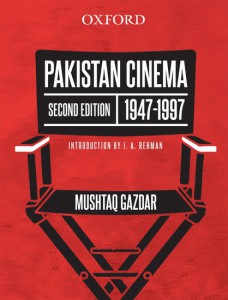Pakistan Cinema
1947-1997


Average rating: ![]()
| 0 | rating | |
| 0 | rating | |
| 0 | rating | |
| 0 | rating |
Your rating: -
Book Presentation:
• Contains anecdotes and reminiscences about the people who shaped the entertainment industry, as well as interviews with directors and producers
• Juxtaposes the artistic development of the cinematic world with the overall social development in the country
First published in 1997 to commemorate the fiftieth anniversary of the creation of Pakistan, the book features a review of films before Partition, plots of great cinema classics, trivia, and cinema lore. It contains anecdotes and reminiscences about the people who shaped the entertainment industry, as well as interviews with directors and producers. But alongside the trivia is a clever synthesis juxtaposing the artistic development of the cinematic world with the overall social development in the country. It shows how the narrow self-interest of the ruling clique clashed with the creative potential of the artistic world, stifling originality and all but destroying the film industry. The narrative is punctuated with over a hundred photographs and contains an index of all the films made to date.
In this second edition of Mushtaq Gazdar's seminal work, I. A. Rehman, Haris Gazdar, and Aisha Gazdar provide an overview of the two decades since, marking seventy years of the country's film industry. The filmography has also been updated to include the last two decades.
About the Author:
Mushtaq Gazdar Mushtaq Gazdar (1937-2000) was one of the foremost filmmakers of Pakistan. With diplomas in film technique from London and Tokyo and his own production house, Films D'art, he scripted, directed, and produced more than 175 short feature films, documentaries, and newsreels in the 1970s-1990s. His films have been screened at international film festivals and his docudrama They are Killing the Horse won him the coveted Grand Prix at the Tampere International Film Festival in Finland. In 1992, he was awarded the prestigious Pride of Performance Award by the President of Pakistan for his contribution to the art of filmmaking. His films have twice been awarded the film industry's famed Nigar Award for the best locally produced documentary film. He has also been associated with international film productions, including the Emmy Award winner Traffik. He was a founding member of the Human Rights Commission of Pakistan and was also on the governing body of the Arts Council of Pakistan and chairman of its affiliated body, Film and Video Forum. Mushtaq Gazdar conducted short film courses and also contributed articles in the local Press.
See the publisher website: Oxford University Press
> On a related topic:
Thinking Past ‘Post-9/11' (2023)
Home, Nation and Transnational Desires in Pakistani English Novels and Hindi Films
by Jayana Jain
Subject: Countries > South Asia
South Asian Filmscapes (2020)
Transregional Encounters
Dir. Elora Halim Chowdhury and Esha Niyogi De
Subject: Countries > South Asia
Love, War, and Other Longings (2020)
Essays on Cinema in Pakistan
by Vazira Fazila-Yacoobali Zamindar and Asad Ali
Subject: Countries > South Asia
Film and Cinephilia in Pakistan (2020)
Beyond Life and Death
Dir. Ali Nobil Ahmad and Ali Khan
Subject: Countries > South Asia
Crossover Stars in the Hindi Film Industry (2020)
Globalizing Pakistani Identity
by Dina Khdair
Subject: Countries > South Asia
The Indian Partition in Literature and Films (2019)
History, Politics, and Aesthetics
Dir. Rini Bhattacharya Mehta and Debali Mookerjea-Leonard
Subject: Countries > South Asia
Filming the Line of Control (2019)
The Indo–Pak Relationship through the Cinematic Lens
Dir. Meenakshi Bharat and Nirmal Kumar
Subject: Countries > South Asia
Activist Documentary Film in Pakistan (2018)
The Emergence of a Cinema of Accountability
by Rahat Imran
Subject: Countries > South Asia
Cinema and Society (2016)
Film and Social Change in Pakistan
Dir. Ali Khan and Ali Nobil Ahmed
Subject: Countries > South Asia
Hindi Cinema and Pakistan (2024)
Screening the Idea and the Reality